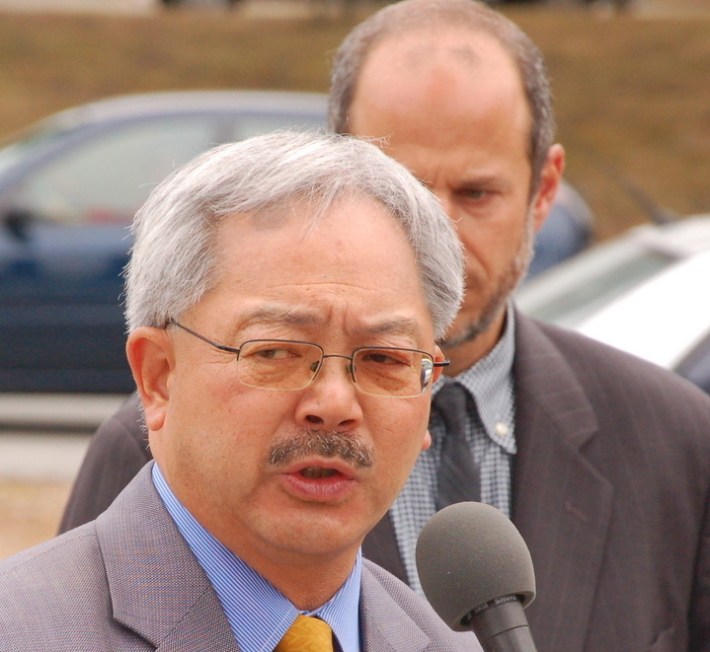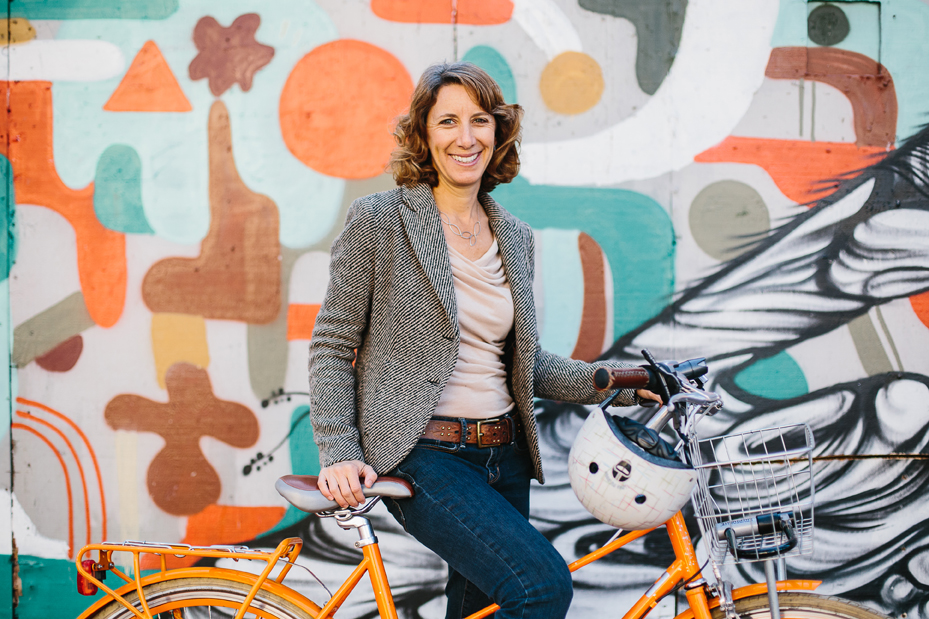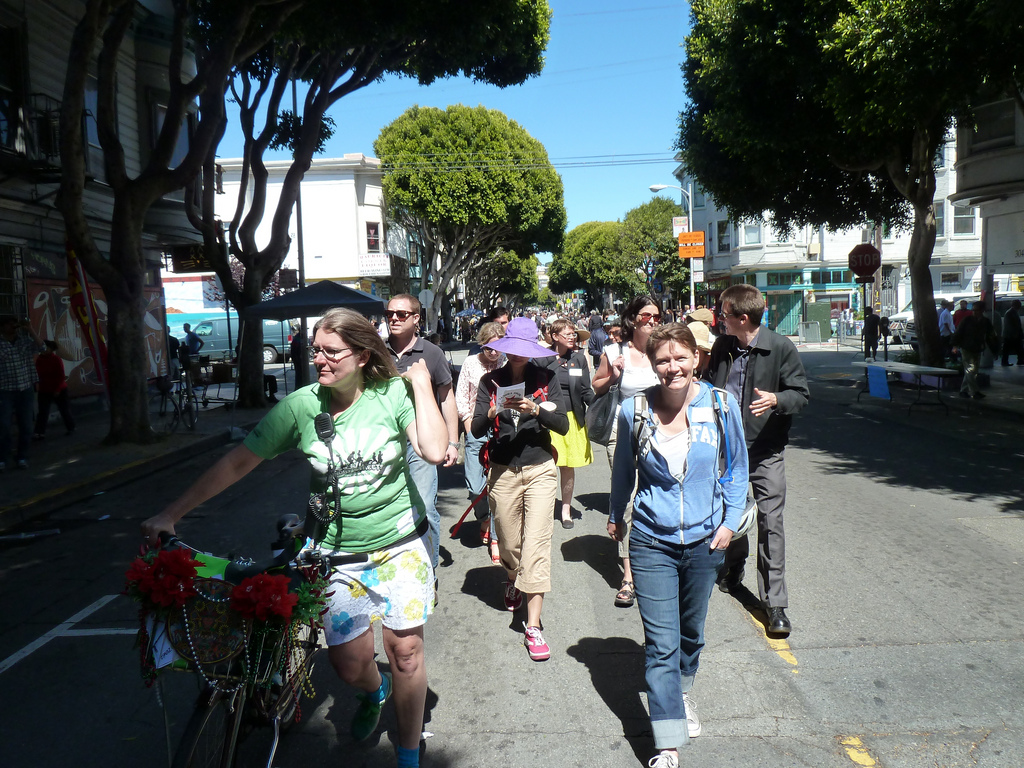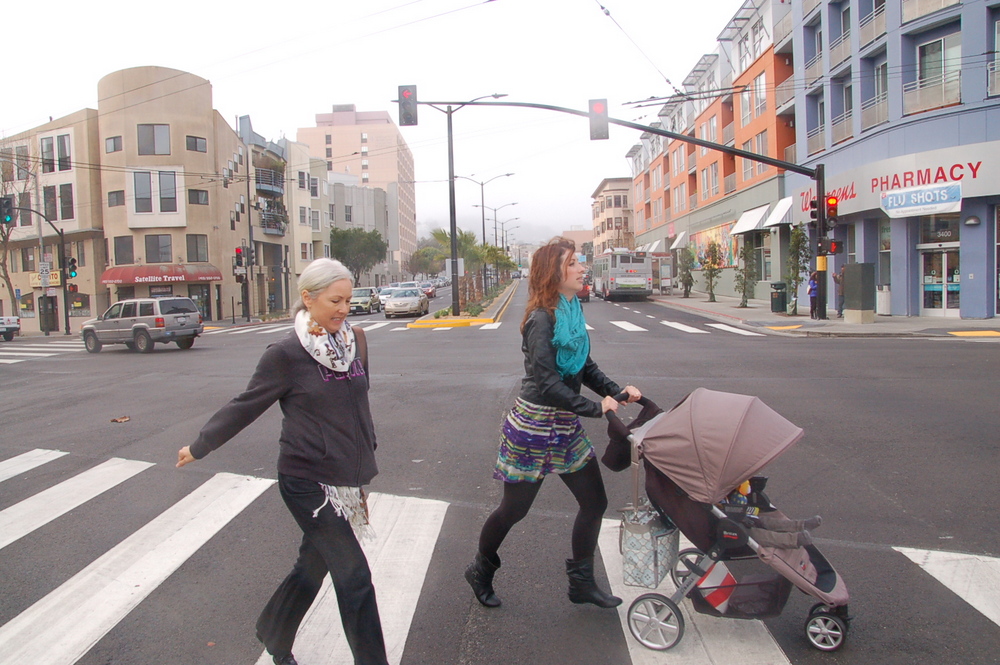
Happy New Year! Before we dive into 2015, let's look back at the best and worst of the year in livable streets with the 2014 SF Streetsie Awards. These are the results from last week's vote, along with some choice awards from Streetsblog staff.

Most Backwards Move by Mayor Ed Lee
There are a lot of ways Mayor Ed Lee could have used his influence to improve transportation in San Francisco, but instead he chose to push the SFMTA Board of Directors to repeal Sunday parking meters. There was no silver lining to the move -- the mayor said it would help get voters to approve transportation funding measures on the ballot, but he dropped his support for the vehicle license fee anyway, and threatened supervisors who supported an alternative transit funding measure. The mayor said that free Sunday parking would quell a popular uprising against parking meters, but we found no evidence of such a revolt. In the end, the transportation funding ballot measures passed with flying colors, and voters rejected the anti-meter Proposition L.
We don't know if Lee was convinced to repeal Sunday meters by church leaders or Sean Parker -- who funded both Lee's mayoral campaign and the Prop L campaign -- but the move undermined the SFMTA’s ability to implement rational transportation policy. And we do have a picture of what damage he did. According to an unpublicized SFMTA report, Sunday meters had cut in half the average time drivers took to find a parking spot during metered hours, from four minutes to less than two, and increased parking turnover businesses by 20 percent.
The repeal of Sunday meters marked the most damaging transportation policy change of 2014 -- and for that, Lee gets the year's first Streetsie.

Worst Defense of Cars-First Proposition L
Speaking of Sean Parker, the billionaire who provided the bulk of campaign funding for cars-first Prop L, his defense of the free parking measure was pretty pitiful: "I have a long-standing frustration that the only people who are significantly disadvantaged by onerous DMV regulations and parking tickets are the working poor."
Of course, all available survey data indicate that the working poor in SF are far more likely to ride Muni than drive cars. And making it easier to get around by walking, biking, and transit also makes it easier for San Franciscans to shed the enormous costs of owning, maintaining, insuring, and fueling a motor vehicle.
As Fortune Magazine put it, "Parker’s enthusiasm is wildly out of sync with San Francisco’s politics." Hopefully, the message voters sent when they overwhelmingly rejected Prop L sank in with him.
Most Shocking Finding About SF's Streets (and What a Model SFPD Station is Doing About it)
The SF Police Department's "Focus on the Five" campaign has apparently been all talk ever since it was announced two years ago. SFPD stats show that every station but one is failing miserably at focusing traffic enforcement on the five greatest threats to pedestrians, even while they hand out more tickets to people walking and biking.
Richmond Station is the only one meeting SFPD's "Focus on the Five" goals. Sure, it's heartwarming to see that at least one SFPD captain gets it, but the rest of the department has no excuse: "It’s not particularly complicated," as Captain Simon Silverman put it. “You just have to dedicate yourself to doing it consistently.”

Livable Streets Legacy Award
Leah Shahum is stepping down after 12 years as executive director of the SF Bicycle Coalition. As one of the most effective and visible leaders in the national movement for sustainable transportation, she leaves a legacy of campaigns that have resulted in safer, more bike-friendly streets, and made bicycling a higher priority at City Hall. Under her guidance, the SFBC has become the largest city-based bicycle coalition in the country, and its successes have inspired leaders in other cities.
Susan King also stepped down after organizing 50 Sunday Streets events, creating what's become the largest open streets program in the U.S. King's legacy will only grow as she establishes the California Open Streets Network (CAOS) to spread the word across the state.

Most Bizarre Sensationalistic Journalism
Speaking of "chaos" and open streets: KPIX reporter Brian Webb deserves an award for sensational journalism for his report about the temporary opening of curvy Lombard Street to people. Webb called the sight of a roadway filled with smiling people "chaos" and a "backfiring" of the SFMTA's attempt to eliminate the block's notorious automotive gridlock. Clearly, visitors young and old cannot be left to run amok on one of SF's most famous streets -- that privilege is reserved for cars.
One honorable mention in the sensationalism department: David Stevenson's scathing KTVU report on the car-share parking space that "can disrupt an entire street." Remember -- parking shared cars instead of private cars is "privatization."
Most Bizarre Explanation for Pedestrian Deaths
Confused Asian-immigrant seniors are unwittingly hurling themselves in front of cars. That's what SFPD Traffic Company Commander Mikail Ali told a reporter in an attempt to explain away deaths that occurred on his watch. This statement deserves a Streetsie Award, lest it be forgotten.
Best Street Transformation
The Cesar Chavez Street redesign turned a six-lane motor traffic sewer into a safer, greener street after years of advocacy from neighbors. The change could have come sooner, and some critics have said that street space devoted to a center planted median could have been better used for protected bike lanes or wider sidewalks. But overall, the transformation is a model for how SF's most dangerous and unlivable streets could made be more people-friendly.
Close runners-up in this popular category include the "Winter Walk SF" plaza that temporarily filled Stockton Street in Union Square, followed by the contra-flow protected bike lane on two blocks of Polk Street.
Boldest Show of Political Courage
In a refreshing show of courage at City Hall, the Board of Supervisors and Mayor Ed Lee held developers to their agreement to fund the Transbay Transit Center. Supervisors, led by Scott Wiener, balked at threats of a lawsuit from developer lobbyists -- including former Mayor Willie Brown -- who wanted their tax assessment rate lowered because skyrocketing real estate values would result in larger contributions towards downtown extensions for Caltrain and California High-Speed Rail. Although a compromise had been proposed, SF's electeds upheld the full original tax rate. That move represents the kind of leadership at City Hall SF needs to see more of in 2015.
For more 2014 Streetsie Awards, check out Streetsblog USA's results posted in two parts.






